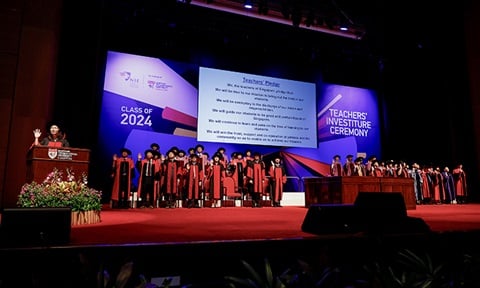Sparking curiosity, creating nurturing spaces: How he wants to guide each child forward
When Eythan Ong started down the wrong path at age 11, his teacher’s firm but encouraging words caught him in time.
“He told me sternly, ‘Eythan, this is not you. These are not your real friends’,” recalls the 24-year-old.
Those simple words, spoken during a quiet moment after class, were especially poignant for a young child who had just moved from Malaysia, and was struggling to adjust to a new country and school environment.
“I was surprised and moved,” he says. “That was the first time a teacher showed concern for my well-being.”
That advice did more than get him back on the right track – it showed him how teachers could change lives.
More than a decade later, the recipient of the Ministry of Education (MOE) Education Merit Scholarship is preparing to become an educator himself.
Eythan is in the final stretch of the four-year Nanyang Technological University-National Institute of Education Teaching Scholars Programme (NTU-NIE TSP), pursuing a double major in chemistry and education, with a minor in mathematics and computational thinking.
Raring to exert the same positive influence on his students as his former teacher did, he wants to guide young minds and ensure that they do not veer off the right path.
Rethinking how students learn
Eythan’s education took him out of the classroom and into a forest.
As part of TSP’s BUILD (Building University Interns for Leadership Development) programme – which allows first-year scholars to gain hands-on experience and develop skills for their future roles as educational leaders – he volunteered as a forest school coach, working with special needs children.
As a form of therapy, students learnt through sensory play: running their fingers over rough tree bark, inhaling the earthy scent of flowers and tuning in to the melodies of chirping birds.
What struck Eythan most was how a coach’s gentle guidance could make a big difference in a child’s experience.
“When a child does something wrong, we tend to say, ‘Don’t do that’,” he explains.
“But in the forest, coaches don’t use that approach. Instead, they ask reflective questions: ‘What do you think you just did? How did it make you feel? How do you think it made others feel? Do you want to do it again?’”
“We need to make learning an interactive and exciting process, not just a passive experience, so students come into class excited to learn something.”
– Eythan Ong, recipient of the MOE Education Merit Scholarship
The following year, Eythan would experience a similar education model built on mutual respect during a five-week teaching stint at a Norwegian public school.
In mixed-grade classrooms, students took charge of their own learning while teachers acted as facilitators.
It made him ponder: How might we let the joy of learning take the forefront instead of always focusing on exams?
“There is a fine balance between the joy of learning and academic rigour. This is something teachers like me are striving to achieve,” he says.
Fresher ways of teaching
Creating nurturing spaces and more conducive learning environments, however, demands new approaches, Eythan discovered.
He explains that students might appear disinterested in class because traditional one-directional teaching methods fail to engage them, especially in this age of shorter attention spans.
“We need to make learning an interactive and exciting process, not just a passive experience, so students come into class excited to learn something,” he says.
Eythan already has a creative solution in mind – using the concept of gamification to make lessons more interactive. By incorporating game-like elements, such as storytelling and virtual rewards, gamification helps create two-way engagement in the classroom.
For a recent assignment, he designed Elementara – a fictional world where students earn points and badges by solving chemistry questions to defeat a villain.
In his second year, he co-wrote a paper with NIE associate professor Toh Tin Lam on how teachers can gamify geometry classes. It won the Best Paper Award at the International Conference on Research Innovations in 2023.
When he begins teaching full-time after graduating later this year, Eythan wants to help each student realise their capacity to grow – just as his Primary 5 teacher did for him.
“When people ask me: ‘What do you teach?’, I always like to say: ‘I don’t teach chemistry’ or ‘I don’t teach maths’,” says Eythan.
“Instead, I say: ‘I teach students’.”
Read the original article here.






.tmb-listing.jpg?Culture=en&sfvrsn=24c8c5ab_1)
.tmb-listing.jpg?Culture=en&sfvrsn=f6ef902b_1)